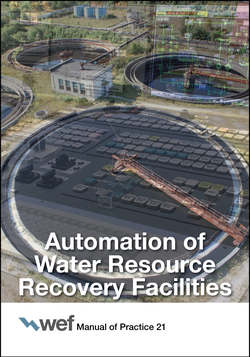Читать книгу Automation of Water Resource Recovery Facilities - Water Environment Federation - Страница 28
На сайте Литреса книга снята с продажи.
2.2.2 Improved Process Performance and Reliability
ОглавлениеAutomation can allow for more accurate and consistent control of a process, resulting in improved performance. Improved performance can take the form of better yields, in terms of the amount of wastewater treated for a given unit of chemicals or energy, or fewer unwanted byproducts. While an operator can occasionally adjust a process based on changing facility conditions, automation can continually adjust the process to more closely track an optimal operating condition. Reliability can also be improved as regular adjustments to alarm conditions and fault handling can be programmed into the control system.
As an example, the Water Environment Research Foundation (2002) presented five case studies of facilities that implemented automatic solids retention time (SRT) control. Significant benefits were demonstrated by the facilities, including improved process performance. Figure 2.1 shows an example of the effects on several process parameters of changing from manual control to automatic SRT control of an activated sludge process. The graph shows more consistent mixed liquor suspended solids and mass of wasted sludge. This affects not only the activated sludge process, but also sludge consistency, thereby improving operation of downstream thickening.
Another advantage to the improved control is the potential to maximize unit performance, potentially delaying upgrades.
